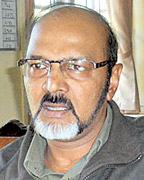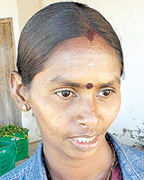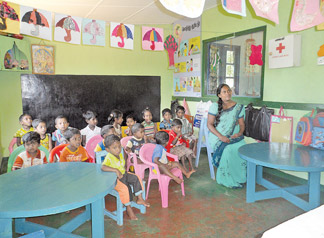The journey from the leaf to the cup
By P. Krishnaswamy
|

Tea harvesting assistants in the field
|
The road to New Peacock Estate from Gampola snakes through a
panoramic view; rolling hills, lush greenery, streams, small townships,
villages, schools and tea estates intermittently laid out. Some places
are breathtakingly beautiful. So are many things in New Peacock Estate -
the location of the tea factory, the General Manager's bungalow, the
staff quarters, the Child Development Centre (the renamed creche), the
tea fields and the eucalyptus plantations.
On an invitation by the Planters' Association of Ceylon (PA), the
representative body of the Regional Plantation Companies (RPC), the
Sunday Observer undertook a visit to the estate in Pussellawa, in the
heartland of Sri Lanka's commercial tea production dating back over one
and a half centuries. The visit was to obtain a first hand knowledge on
the living and working conditions of the workers and the
labour-management relations. The estate, one of the RPCs - the Elpitiya
Plantations PLC - is now managed by Aitken Spence Plantations.
Interestingly the PA, pioneer of the tea industry, was established in
1854 and the first estate for tea export production, Loolcondera Estate,
was started by them in the same area as New Peacock some two decades
later.
 |
| MD Sarath Pahathkumbura |
 |
Allimuthu
Balakrishnan |
 |
Packianathan
Bawani |
On entering the estate we first went to the office where the General
Manager, Senarath Pahathkumbura was waiting for us. He is a very
courteous gentleman with a long experience as a tea planter. He answered
all our questions, mainly relating to industrial relations, shortcomings
of the workers and the management, sustainability of the tea industry
and the long-term problems, the management faced.
As per the display boards in the GM's office, the estate was managed
by Whittalls Estates & Agencies Ltd prior to nationalisation. Until 1955
Englishmen had continued to be superintendents or managers. From 1920 to
1960 A.G. Brabazon, A.S. Montegomary, H.S. Hurst and L. Ebshells had
remained managers and, interestingly, one time State Minister of Defence
Ranjan Wijeratne was the first Sri Lankan to be manager of the estate
after them.
We were also taken to tea fields where pluckers were at work,
weighing sheds, the tea factory installed with the modern CTC machines,
the Child Development Centre and the eucalyptus plantations. The 535
hectare estate has three divisions and 532 registered workers,
comprising about 3,000 persons as family members. Each division has a
government school up to primary level and a common dispensary. There is
an estate ambulance to transport the sick to the Pussellawa Government
Hospital. The Medical Officer of Health (MOH) for the area pays monthly
visits to the estates to examine and prescribe medicine to the sick,
according to the estate management. Female workers are entitled to 72
days paid maternity leave at the rate of Rs. 410 per day (total Rs.
29,520) for the first two children, management sources said. For the
third child the management pays at the rate of Rs. 410 per day for 36
days.
The People's Bank and the Bank of Ceylon granted them soft loans to
renovate and upgrade school buildings, MD Pahathkumbura said. Families
of this estate have not so far been benefited under the modern housing
units provided by the Economic Development Ministry and the National
Housing Development Authority (NHDH). But the Sunday Observer found that
the narrow and unclean line-room quarters were no longer visible and the
workers had, on their own initiative, extended and expanded their
line-room quarters. The estate management gave 7 perches of land to a
family for the construction of new houses and the Cooperative Society
established for them provided long-term housing loans up to a ceiling of
Rs. 50,000, he said.
He said some of the families engaged in dairy farming while working
on the estate and the management had provided them the facility of
cut-grass from ravines in the estate while they also had developed small
plots of grasslands at the backyards of their homes.
The living quarters of the workers are provided pipe-borne water.
Electricity has so far been provided to 85 percent of the families. The
estate management is encouraging sports among the workers and,
volleyball being their favourite game, volleyball courts and all other
assistance to promote the game have been provided, Pahathkumbura said.
The estate management provided the mid-day meal and a glass of milk
to each child, Pahathkumbura said. Each year the management provided a
school bag and books for the children. Fifty percent of the cost of the
uniforms are borne by the management while the balance is borne by the
parents, he said.
At the weighing sheds we talked to both, female and male workers
about their monthly income, working and living conditions and housing as
compared to that of their parents or forefathers. Many had been in
estates for four to five generations. As an important milestone in the
history of the plantation community, New Peacock Estate has given name
tags, with designations, to all workers to be worn while on duty.
|

Children in the Child Development Centre with the CDO |
Packianathan Bawani (28), one of the Harvesting Assistants we talked
to said her husband M. Sivapragasam (31) and she are employed on the
estate and her monthly wage is Rs. 15,000 to Rs. 16,000 and her
husband's was about Rs. 11,000. They have two children, a girl aged 7
and a boy aged 6 and that both are schooling in the government school in
New Peacock Estate. Her retired parents are also living with her. The
income from their employment on the estate is substantial compared to
what her parents got and she had nothing to complain, she said. They
have a TV set with satellite connection. Almost all families in the
estate had TV sets with satellite connections, she said. Most of the
families have telephones, either mobile phones or land phones, she said.
The services provided at the CDC, including the pre-school education,
are excellent, she said. Allimuthu Balakrishnan (47), a male worker said
his wife Sinnapooranam Yogarani (37) and he are employed on the estate
for 20 years and 30 years respectively and their children are schooling.
He said his monthly wages is about Rs. 10,000 while that of his wife is
Rs. 12,000 or more depending on the attendance. He said he is rearing
goats to supplement their income.
He said they have been on the same estate for five generations. He
was not given the Bank Loan or the NHDA loan for renovating his house,
but only the Cooperative Society gave a soft loan of Rs. 25,000. The
Cooperative Society also extended financial assistance for weddings,
funerals and other important functions in the family, he said. He on his
own expenditure renovated and expanded his house, he said. We talked to
some more workers selecting them at random at the weighing shed and in
the tea fields and all of them expressed similar views in relation to
the services at the CDC and other facilities.
|



